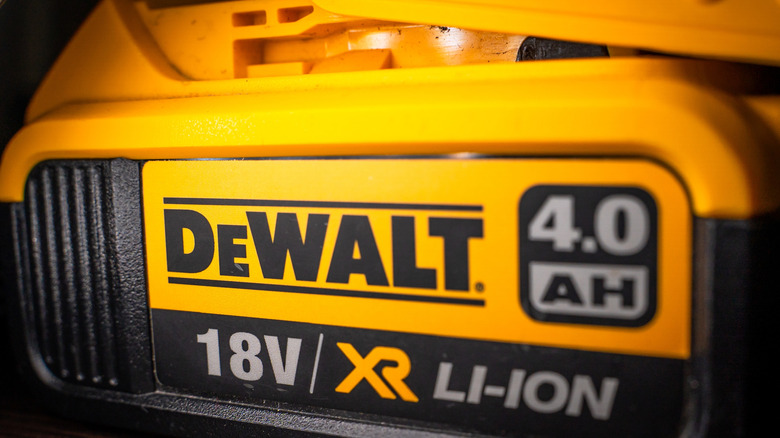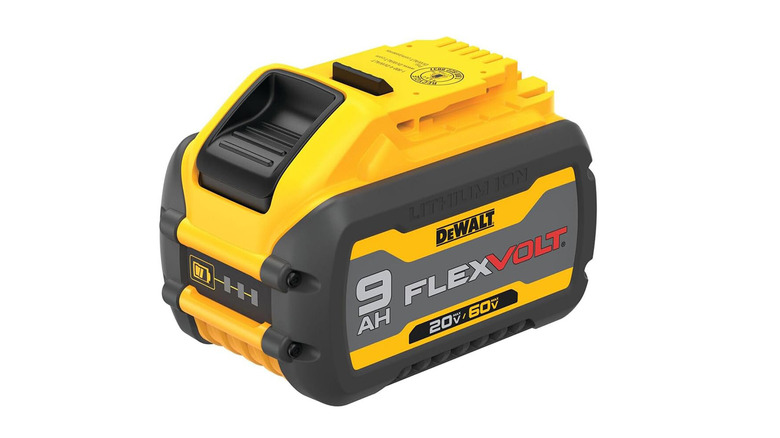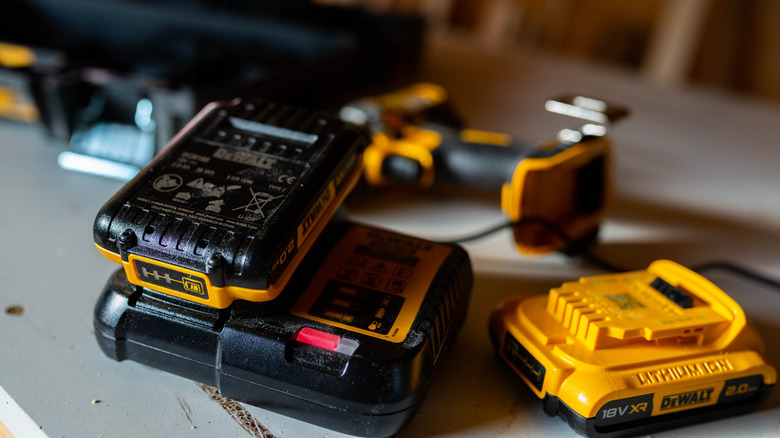DeWalt Batteries Dying Too Fast? This Could Be Why
We may receive a commission on purchases made from links.
There's no doubt that the advent of cordless tools was a huge boon for both commercial and domestic power tool users. Freed from the shackles of dragging long extension cables everywhere or risking not having access to power, battery power revolutionized power tool use. However, the technology isn't without drawbacks. Perhaps the most obvious downside is needing a supply of charged batteries. If you have a limited supply, it's tempting to squeeze that very last drop of juice out of each one to optimize your work time.
However, the official guidance from DeWalt is that running a battery until it's completely drained could damage it. DeWalt recommends that you stop using a battery the moment you detect a loss of performance from the tool. This prevents the battery's voltage from dropping so low that adverse chemical reactions begin to damage its internal materials.
Draining a battery is often referred to as "deep discharging" and can cause significant degradation to its capacity. In the worst cases, the chemical reaction within the battery is so severe that the battery is damaged beyond repair. Of course, this isn't the only reason a DeWalt battery can seem to die too soon. Heat, cold, storage, and bad charging practices can all be detrimental to a battery's life. DeWalt batteries have some common problems, and to get the most from them, it helps to understand what else quietly chips away at their capacity.
DeWalt battery care: Best storage practices
Power tool batteries aren't cheap. For instance, the DeWalt Flexvolt 9AH battery has a full retail price of $219 at the time of writing. It's a serious investment for what is ultimately a consumable. It makes sense, then, that prolonging the life of your battery should be a priority. A good first step is to make sure you don't push each charge beyond its capabilities, but there are some other steps that can help you get the most from a DeWalt battery. First, let's look at battery storage. According to DeWalt, if you're storing a battery for a prolonged period (over six months or so), it's important to fully charge the battery before storing. In fact, for shorter storage periods of a few days or more, it's safe to leave your Dewalt battery in its charger. This allows the charger to perform equalization and maintenance processes.
You should also avoid storing the battery on its tool. With a battery attached, even when powered off, power tools can still draw a little power from it. In the short term, this is unlikely to make a difference, but over longer periods, the battery could completely drain, potentially leading to all the associated side effects that can affect fully discharged batteries. Of course, when storing your DeWalt battery, the proverbial "always store in a cool, dry place" also applies.
Other DeWalt battery best practices
Here's a scenario that's likely familiar to many — the two-battery use/swap/charge shuffle. Like fully discharging your battery, this seems like a convenient way to get the most from your batteries. This happens when a used battery is taken directly from the tool and immediately charged, before being replaced with another battery fresh from the charger. While this certainly means your batteries will be available quicker, it isn't doing your batteries any good. It's always best to let the battery cool down before charging. DeWalt recommends keeping the battery off the charger until its temperature has dropped to around room temperature. This can take up to two hours.
The external temperature also has a known effect on a charged battery's performance and can also affect the charging process. For DeWalt batteries, it's recommended that batteries be charged in an environment with a temperature range between 40 and 105 degrees Fahrenheit. Batteries charged outside this range won't take a full charge. Additionally, this can cause permanent damage with resulting loss in battery run-time.
Finally, a little care and attention never goes amiss. Cleaning the battery's terminals is always good practice. This can help to keep the battery's performance optimized and prolong its life. If you're not sure how best to approach this, then our guide to cleaning DeWalt battery terminals is a great resource. Power tool batteries are not cheap. However, a well-looked-after DeWalt battery will typically last two to three years, so it's well worth a little effort.


